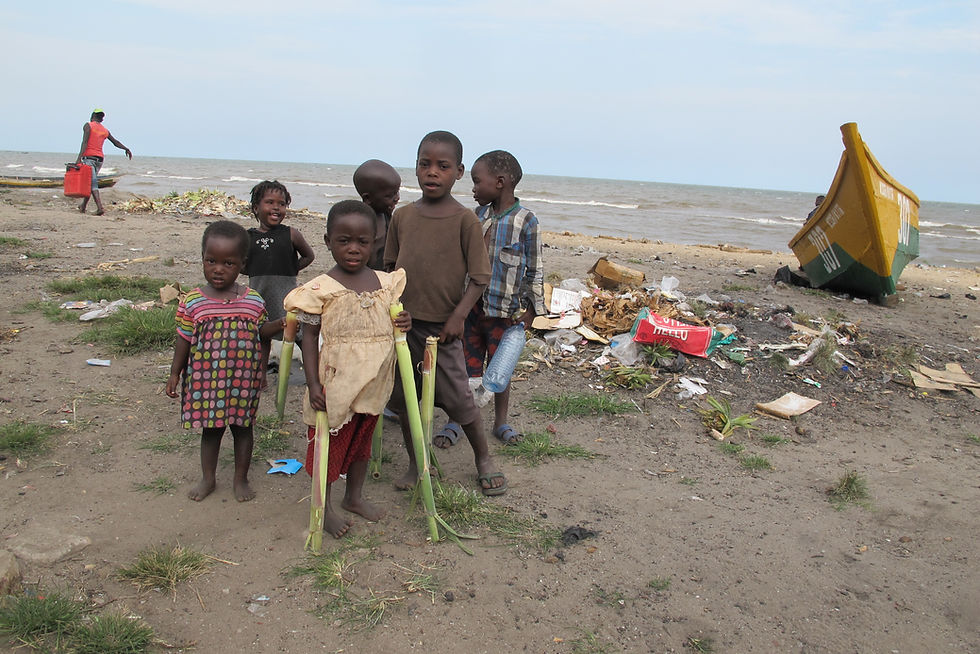Kasensero: The Town of Fishermen, Sex Workers, and Nothing Else.
- Radhika Venkataraman
- May 7, 2018
- 3 min read

When the HIV/AIDS epidemic first broke out in 1982, in Kasensero, it was defaulted for witchcraft. Today, it is one of the most sensitized towns in all of Uganda. Men and women walk into clinics, without fear or humiliation. However, Ugandans as a whole hold a darker image of Kasensero. Located on the western bank of Lake Victoria and bordering Tanzania, Kasensero has become a hot spot for fishermen, sex workers and HIV.
After the long journey on the dirt roads and hills from Kalisizo to Kasensero, we finally reached the town where the epidemic all began. We went there to learn more about the journey that took place and how far the town has come. The aura of a red light district was present. Men playing cards and loitering around, women chitchatting with their friends and waiting for their next customers, and children randomly scattered or running up to wave to us “muzungus.” Up until now, I had only heard stories of the horrors that these women face on a daily basis. During our prior meetings in Kampala, Kasansero was mentioned quite often as an example of violence against sex workers.
Just by glancing around, I noticed the general demography: young men, young or middle-aged women, and children. The fishermen of Kasensero have a set routine. They begin and end their day rather early. After risking their lives in the crocodile-infested lake, they usually go straight to the bars to drink and spend the rest of the day with the sex workers. The sex workers, however, have a different story. Many of them travel from Kampala, looking to make a quick buck, and in the process, contract HIV. If they wish to engage in protected sex, their value decreases. Treated like any other commodity, they are high in demand and price at first. As a couple of months pass by, their value decreases. Some choose to stay on in Kasensero while others go back to Kampala, spreading the disease further.
Where there are sex workers, there is gender-based violence (GBV). Since prostitution is illegal per the 1950 Penal Code, men can take further advantage of the sex workers, and this creates additional complications for the women. They are reluctant to complain to any authorities if men physically abuse them during sex. The men also threaten to expose their profession, if they do not wish to pay the sex workers. Although this scenario was common throughout Uganda, Kasensero had other issues tied to it.
In addition to all this, Kasensero is home to many children. There is only one small primary school present in Kasensero, and the nearest secondary school was at least 40 kilometers away. I was surprised to see so many children loitering around not in school. I asked Francis Kato, the only health care worker in Kasensero, about the children’s future. His reply was simple: “the boys grow up to be fishermen, and the girls will become sex workers.” As he said this, a small girl, who was following us around the town, looked at me and beamed. Her smile was so precious, but all I could think of was her future. Her fate, like many others, is seemingly sealed.
Kasensero was a crucial part of our trip to Uganda. On our way back to Kalisizio, I could not help but repeatedly think about Francis’ reply. The women of Kasensero are helpless and desperate. The government does not want to recognize the sheer nature of their profession, let alone the number of related issues. The children are oblivious to their future. Most of the country was not willing to help or provide the necessary support to the community. Anyone who was willing to help feared that they would engage in similar activities and be blacklisted from the society, and would not go ahead with their intentions to better the situation in Kasensero. It was almost as if they did not want to admit that Kasensero was even part of Uganda. With no entity stepping forth to help, this town appears to be a lost cause. The conflict of interest between the people of Kasensero and the Government of Uganda is so strong that a solution may be nearly impossible. Though the people of Kasensero might have been sensitized, the town itself is seen as a taboo.








Comments